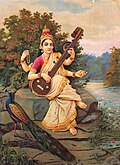Theory
Arohana and avarohana
Arohana: S Ṟ G M P D Ṉ Ṡ [a]
Avarohana: Ṡ Ṉ D P M G Ṟ S [b]
Key:
S, G, M, P, D: shuddha (natural);
r, n : komal (flat);
Pa and Sa are sometimes avoided in ascending Arohan. The descent can be direct, but is often expressed as S' N d P m, G m Gr ~ S with a slight oscillation on komal re to express the character of Bhairav. [1]
Pakad or Chalan
S, r G M, G M r, ṇ Ḍ, ṇ r S
| komal Ni, shuddha Dha, komal Ni, komal Re, Sa | is the most characteristic run, where the Ni and Dha belong to the lower octave and the Re and Sa are from the middle octave. Some andolan/oscillation is typically at the flattened second (komal re).
Organization and relationships
It may include impressions of Kafi. The image of Ahir Bhairav is easily maintained with the characteristic passage ṇ Ḍ ṇ/r~ S [1] with the characteristic Bhairav andolan (oscillation) on komal re. Sometimes shuddha ni is used in the lower octave to emphasize the Bhairav character. [2]
The Carnatic music equivalent to this raga is Chakravakam.
Related ragas:
Thaat: Bhairav
Recordings and compositions
Ravi Shankar, Three Classical Ragas. His Master's Voice LP, 1957. and Angel Records CD, 2000.
Hariprasad Chaurasia, Raga Ahir Bhairav and Marriage Song from Uttar Pradesh. Nimbus Records CD, 1987.
Nikhil Banerjee, Raga Ahir Bhairav. Multitone Records, UK Limited, 1995. LP. (Available on iTunes.)
Wasif-ud-din Dagar, Chalo sakhi braj raje. Alap and Composition in Dhamar. Music Today. A97015. Cassette. [3]
Traditional compositions in Raag Ahir Bhairav are:
This page is based on this
Wikipedia article Text is available under the
CC BY-SA 4.0 license; additional terms may apply.
Images, videos and audio are available under their respective licenses.
